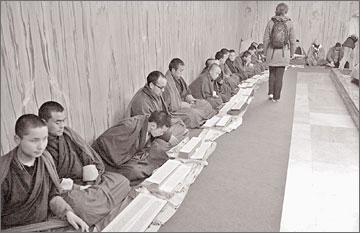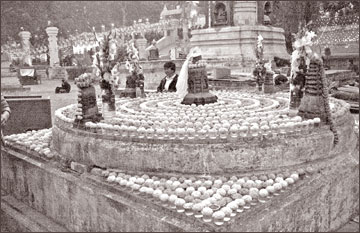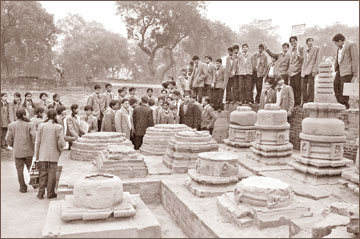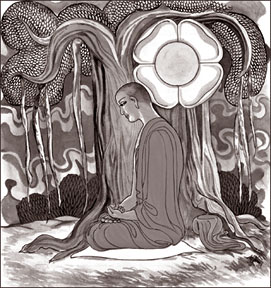|
BUDDHIST SPECTRUM
Revisiting the inheritance
Buddhists all over the world would always find inspiration from
places linked to the Buddha’s life Sumanachandra Ariywansa captures
memorable moments of pilgrims breathing in the serenity of where once
the Master lived.

The robed statue of the Buddha |

Monks carrying a robe in procession to be offered to the
Lumbini shrine |
 |

Monks reciting Maha Parinibbana Sutta in Kusinara where the
Buddha passed away |

Flowers offered in tribute to the Bodhi tree, where the
Buddha achieved Enlightenment |
A monk
reciting Pirith in Lumbini Vihara, where the Buddha was born
as Prince Siddhartha |

Pilgrims trying to take a glimpse at the gong located by the
entry gate of Jethavana Vihara that sheltered the Buddha for
a long time |

Crowds studying the remains of Nalanda University |
|
[Book Review]
Ideal study of Buddhism
Title : The Buddhist
Editor : Rajah Kuruppu
Publisher : Young Men’s Buddhist Association
Price : Rs 125
Page count : 76 pages
Reviewed by E M G Edirisinghe
 The
issue of the 126th volume of The Buddhist the bilingual Buddhist journal
founded in 1888 and published by the YMBA, Colombo brings out several
articles which enlighten the reader with a variety of topics covering
several aspects which arise when a reader focuses on Buddhism in depth. The
issue of the 126th volume of The Buddhist the bilingual Buddhist journal
founded in 1888 and published by the YMBA, Colombo brings out several
articles which enlighten the reader with a variety of topics covering
several aspects which arise when a reader focuses on Buddhism in depth.
The articles it carries in Sinhala and English make the average
reader richer in the knowledge of the Dhamma. The ‘guardians of world’
by Bhikkhu Bodhi who is considered the best living exponent of Theravada
Buddhism, concentrates on mental constitution which covers both the
individual and the society. ‘Nibbana’ by Ven.
Luand Poe Sumedha says that the word Nibbana is undefinable, and he
goes on to explain it as the status in which on experiences ‘the reality
of non-grasping.’
Similarly, ‘Vipassana Meditation’ is the subject which Ven Dr Revatha
Dhamma does discuss. ‘Vipassana’, says he, ‘means to use to see things
as they really are leaving no room for intrusion of imagination or
illusion.
In his contribution, Dr. Ananda W P Guruge observes why does Buddhism
appear to be so favoured in the world. Buddhism has become relevant as
education, science and technology are making giant strides in the world
today. Suranga Weerapperuma’s ‘How Buddhists Express Their Devotion’ is
an interesting contribution which says that clarity and serenity
characterizes the mind of a practising Buddhist.
Tissa Devendra’s piece is a tribute to Prof G P Malalasekera for
making his dream of a World Fellowship of Buddhists come true. With his
‘Economic Impact of Observing the Five Precepts,’ Olcott Gunasekera
factually advances the theory that adherence to the five precepts will
make one not only spiritually richer, but economically too.
This detailed analytical study of the offences committed by prison
inmates arranged on the basis of breach of the Buddhist five precepts,
65.5 percent of them are convicted of alcohol and drug related offences
while 12.7 percent are convicted of offences related to stealing and
theft.
Woman and Buddhism, in relation to ordination in particular, is the
subject of Anil D Amarasekera’s write-up. As far as Nibbana the summom
bonum in Buddhism is concerned, it is equally within the reach of both
man and woman without any discrimination.
Touching on a serious Buddhist theme R L Ihalamulla makes his
analysis under the subject ‘The Great Myth about suffering and its
Cessation,’ he says “suffering is inherent in mankind which manifests
itself in mild to severe forms. “Knowledge alone cannot bring happiness
defeating suffering. The Noble Eight-fold Path is the
only solution to suffering. Everything else is temporary.
Dr Wickrama Weerasooriya draws the attention of the reader with his
learned least written least discussed subject of Buddhist
Eccelesiastical Law. According to him this subject is quite vast and is
far from what an average Buddhist seems to think. Dr Siri Nissanka
Perera’s contribution The Buddha Born in Bharat is an attempt to focus
on the Buddha from an historical perception. While, according to Dr
Kariyawasam’s Buddhist concept of Human Person, it is an analytical
approach to puggala, aththa and saththa as conceived in the Buddha
Dhamma.
Buddhism and the national environment are inseparable. Prof Lilie de
Silva who concentrates on this subject says that the main reason for
environmental pollution is the projection of one’s own polluted mind.
The attitude of Buddhism to nature is that man should be primarily
non-aggressive and soft.
According to Dr Dharmasena’s assertion what the Buddha preached the
laity is not to run away from lay life but to stabilise oneself in noble
life to make lay life satisfying and productive.
This volume of ‘The Buddhist Journal’ is pleasantly readable and
stimulating, and what is more important is that it is a volume that
enriches the reader’s knowledge on the path to understanding the Dhamma.
Why Buddhism?
Lionel Wijesiri
 Why
is Buddhism the fastest growing religion in the western world? The
answer to this inquiry is multi-layered and complex. It is a tantalizing
issue because it highlights the changing spiritual landscape of the West
and provides an insight into just how multicultural the West has really
become. Why
is Buddhism the fastest growing religion in the western world? The
answer to this inquiry is multi-layered and complex. It is a tantalizing
issue because it highlights the changing spiritual landscape of the West
and provides an insight into just how multicultural the West has really
become.
How is it possible for a 2,500-year-old philosophy, which began 500
years before Christianity and 1000 years before the Muslim faith, to be
relevant to modern life in the West? Considering all the other ancient
religions that have faded from contemporary practice, such as the sun
worshippers of Ancient Egypt, the human sacrifices of the South American
Mayans and the Druids from the Dark Ages of England, Buddhism has
outlasted them all
Buddhism is a living, growing religion today because it succeeds in
conserving many of the highest moral values of its adherents. It
promotes calmness and self-control, augments serenity and happiness, and
does much to prevent sorrow and mourning. Those who believe this
philosophy live better lives than many who do not.
Free Thinkers
Westerners believe that Buddhism is a scientific religion. Gautama,
the Buddha, is honoured today by every cultured and intellectual man
irrespective of whatever religion he may profess, while the founders of
most of the other religions are honoured only by their followers. Not
only have those who belong to some other religions but also the ‘free
thinkers’ respected this world honoured Supreme Enlightened One.
Bertrand Russell, in his presentation ‘Why I am not a Christian’
says, ‘I cannot myself feel that either in the matter of wisdom or in
the matter of virtue Christ stands quite as high as some other people
known to history? I think I should put Buddha above him in those
respects.
H. G. Wells, famous writer and teacher, says, ‘Buddha in a different
language called men to self-forgetfulness five hundred years before
Christ. In some ways he was nearer to us and our needs. Buddha was more
lucid upon our individual importance in service than Christ, and less
ambiguous upon the question of personal immortality.
Albert Einstein, famous physicist and philosopher comments, ‘The
religion of the future will be a cosmic religion. It should transcend a
personal God and avoid dogmas and theology, covering both the natural
and the spiritual, as a meaningful unity.
Buddhism answers this description.’ Rev. Joseph Wain remarks,
‘Buddhism taught a life not by rule, but by principle, a life of beauty;
and as a consequence, it was a religion of tolerance.
It was the most charitable system under the sun. ‘These are just a
few among the thousands of quotes by the illustrious personalities
around the world.
Educated men and women in the West Began to appreciate Buddhism for
three fundamental reasons: Buddhism teaches that all men are born equal
and free to choose whatever is best for them. Buddhism teaches that all
life is interconnected, so loving and compassion are natural and
important: it focuses on personal spiritual development and the
attainment of a deep insight into the true nature of life.
Why I am a Buddhist
Stephen T. Asma is Professor of Philosophy and distinguished scholar
at Columbia College Chicago, He works on the philosophy of the life
sciences, and the theme of Religion and Science (especially
Buddhism and Christianity). Prof. Asma wrote a book titled ‘Why I Am a
Buddhist’. Part of his introduction to the book is quoted below. He
answers in simple terms why he became a Buddhist and why Buddhism
matters to him.
‘Buddhism has a core set of elements that inform its approach to
life, and these were not just recommended on the authority of the
Buddha’s charismatic personality. They were put forth, using argument
and evidence, as testable and verifiable truths that could be
corroborated by anyone who cared to investigate them. In that sense,
Buddhism is not a set of beliefs to be adopted by faith, but a set of
practices and beliefs to be tested and then employed in our pursuit of
the good life.’
‘I will slowly unpack these elements of Buddhism (collectively
referred to as the Dharma) by looking at some specific challenges of our
modern life. How can Buddhism be applied to our lives in the workplace?
How can Buddhism inform and ameliorate our increasing biotech moral
quandaries (genetic therapy, stem cell research, mood medications,
nanotechnology, etc.)?
How can Buddhism help Americans in the ‘war of the sexes’ and the
ongoing reformulation of the family? How can Buddhism, with its emphasis
on conflict resolution, contribute to and clarify such issues as
‘nation-building,’ ‘religious tolerance,’ and the ‘war on terror’?’
‘And how can Buddhism better educate or moderate our national
pastimes of entertainment and consumption? Buddhism has beneficial
wisdom to help us navigate even the most arduous aspects of modern
life.’
‘While I was writing this book, a news story filled the media— the
same story that fills the media every year around Thanksgiving. The day
after the holiday is celebrated as the high holy-day of
consumerism—Black Friday.
Consumers line up all night long outside retail stores, and when the
stores open, the patrons, filled to the brim with cravings, actually
trample each other in a stampede to get the consumer products.
This time around an employee at a superstore was actually crushed to
death. When patrons of the superstore were informed of the tragedy, they
disregarded the management’s attempt to close the store and instead went
on shopping—refusing to leave.
Many lesser injuries ensued all around the country. While everyone in
the media and the wider culture dutifully reported the death and the
injuries with gravitas, there was no question or critique of the larger
ideological assumption—furious consumption is healthy for America. If
anyone doubts the relevance of Buddhism for Americans, I recommend they
spend some time watching the depressing YouTube videos of people getting
trampled in order to get TVs and video games. |



